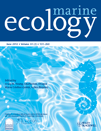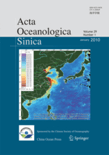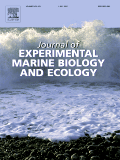
CAHIERS DE BIOLOGIE MARINE
Scope & Guideline
Advancing Research in Marine Biology
Introduction
Aims and Scopes
- Marine Biodiversity and Taxonomy:
The journal emphasizes the documentation and study of marine biodiversity, including the identification and classification of various marine organisms, from invertebrates to fish and algae. - Ecological and Environmental Studies:
Research that investigates the interactions between marine species and their environments, including studies on community dynamics, habitat utilization, and ecological relationships. - Impact of Anthropogenic Factors:
Papers addressing the effects of human activities on marine ecosystems, including pollution, climate change, and the introduction of non-native species, highlighting the need for conservation efforts. - Functional Biology and Physiology:
Studies focusing on the physiological adaptations and functional biology of marine organisms, providing insights into their survival strategies in varying environments. - Conservation and Management Strategies:
The journal encourages research that informs policy and management strategies aimed at the sustainable use and conservation of marine resources.
Trending and Emerging
- Impact of Climate Change on Marine Ecosystems:
Research examining how climate change affects marine species and ecosystems is on the rise, with a growing emphasis on understanding resilience and adaptation mechanisms. - Invasive Species Research:
There is an increasing number of studies on non-native species and their ecological impacts, reflecting a growing concern over biodiversity loss and ecosystem integrity. - Molecular and Genetic Studies:
The use of molecular techniques for species identification and phylogenetic studies is expanding, allowing for more nuanced understandings of biodiversity and evolutionary relationships. - Pollution and Marine Debris Studies:
Research focusing on the effects of pollution, particularly microplastics and other debris, on marine life is trending, underscoring the urgent need to address marine environmental health. - Sustainable Marine Resource Management:
There is a notable shift towards studies that inform sustainable practices for marine resource management, integrating ecological, social, and economic perspectives.
Declining or Waning
- Traditional Fisheries Studies:
Research focused on traditional fishing practices and fisheries management has decreased, possibly due to a shift towards more holistic ecosystem-based approaches and the incorporation of socio-economic factors in marine resource management. - In-depth Morphological Studies:
While morphological studies remain important, the emphasis on detailed morphological analyses has waned in favor of molecular and genetic approaches that provide more comprehensive insights into species relationships and biodiversity. - Generalized Marine Ecology Studies:
There has been a decline in broad, generalized studies of marine ecology without specific focus. Researchers are increasingly focusing on specific interactions or case studies rather than overarching ecological assessments.
Similar Journals

THALASSAS
Unveiling the Secrets of the Sea for a Sustainable FutureTHALASSAS is a prominent academic journal specializing in the fields of Aquatic Science and Oceanography, published by Springer International Publishing AG. Established in 2005 and running through 2024, this journal serves as a vital platform for sharing groundbreaking research and innovative findings related to the marine environment and its ecosystems. With an ISSN of 0212-5919 and an E-ISSN of 2366-1674, THALASSAS is indexed in Scopus and currently holds a Q3 classification in both Aquatic Science and Oceanography for 2023, reflecting its relevance and contribution to these scientific disciplines. Although it does not follow an Open Access model, THALASSAS offers valuable insights for researchers, professionals, and students interested in sustainable ocean management and aquatic biodiversity. Its rigorous peer-review process ensures that published articles meet the highest standards of academic quality, fostering a deeper understanding of marine sciences and addressing critical issues facing aquatic systems today.

VIE ET MILIEU-LIFE AND ENVIRONMENT
Bridging Research and Conservation in Aquatic SciencesVIE ET MILIEU - LIFE AND ENVIRONMENT is a pivotal journal in the realms of aquatic science and ecology, serving as a vital platform for researchers and professionals interested in the interconnections between living organisms and their environments. Published by the esteemed OBSERVATOIRE OCEANOLOGIQUE BANYULS in France, this journal has been disseminating valuable research since its inception in 1980, with volumes covering various topics pertinent to environmental dynamics through to 2024. Despite its current classification in the Q4 quartile for both aquatic science and ecology, the journal offers a unique opportunity for scholars to contribute to niche areas often overlooked by more prominent publications. VIE ET MILIEU is committed to fostering a comprehensive understanding of ecological interactions and the conservation of aquatic ecosystems, making it an essential resource for those engaged in environmental science and biology. Researchers can access a wealth of knowledge that supports their work, encourages collaboration, and inspires innovative approaches to pressing ecological issues.

REVMAR-Revista Ciencias Marinas y Costeras
Empowering voices in marine and coastal sciences.REVMAR-Revista Ciencias Marinas y Costeras is an esteemed open-access journal published by the Universidad Nacional, Facultad de Ciencias Exactas y Naturales in Costa Rica. Since its establishment, it has focused on disseminating high-quality research in the fields of Marine and Coastal Sciences, contributing significantly to the understanding of aquatic ecosystems and their conservation. With a commitment to academic excellence, the journal has been continuously accessible since 2009, allowing researchers from around the globe to share findings without barriers. Although it holds a Q4 ranking in several key categories including Animal Science, Aquatic Science, and Ecology, the journal provides a vital platform for scholars at all stages of their careers to contribute to important dialogues surrounding marine biodiversity and environmental sustainability. As it enters a period of convergence from 2019 to 2024, REVMAR aims to enhance its visibility and impact within the scientific community while maintaining a focus on innovative research that addresses pressing ecological challenges faced by marine and coastal environments.

BIOLOGY BULLETIN
Advancing Biological Insights for a Sustainable Future.BIOLOGY BULLETIN is a prominent academic journal published by PLEIADES PUBLISHING INC, dedicated to advancing the fields of Agricultural and Biological Sciences as well as Biochemistry, Genetics, and Molecular Biology. With an ISSN of 1062-3590 and E-ISSN of 1608-3059, the journal has been a vital resource for researchers and professionals since its commencement in 1996. Located in the United States, BIOLOGY BULLETIN operates within a highly competitive academic landscape, achieving a 2023 ranking in the Q3 quartile for Agricultural and Biological Sciences and Q4 for Biochemistry, Genetics, and Molecular Biology, highlighting its commitment to delivering impactful research despite its challenges. Researchers seeking to publish their findings will find a platform for significant insights, as reflected in its Scopus rankings, where it stands at #183 and #199 out of 221 in its respective categories, showcasing opportunities for growth and visibility. While currently not an open-access publication, BIOLOGY BULLETIN plays a crucial role in facilitating scholarly communication and fostering an understanding of biological sciences, making it an essential read for academics, professionals, and students alike.

Marine Ecology-An Evolutionary Perspective
Unraveling the Mysteries of Marine BiodiversityMarine Ecology-An Evolutionary Perspective, published by WILEY, is a renowned journal dedicated to advancing the understanding of marine ecosystems through the lens of evolutionary biology. Established in 1980, the journal has firmly positioned itself as a vital resource in the field, currently boasting a 2023 Scopus rank of #337 in Ecology, Evolution, Behavior and Systematics and a Q2 category ranking in Ecology. With a focus on original research and reviews that encompass a broad spectrum of marine ecological studies, this journal critically examines the mechanisms driving marine biodiversity and ecosystem dynamics. Researchers, professionals, and students alike benefit from the journal’s comprehensive insights and robust analyses, which are pivotal for fostering ecological knowledge and informing conservation efforts. Although currently not an Open Access publication, the journal remains accessible through various academic platforms, inviting the scientific community to engage with its vital contributions to aquatic science and the evolutionary processes shaping our oceans. With an impressive trajectory that extends until 2024, Marine Ecology-An Evolutionary Perspective continues to set benchmarks in marine research.

ACTA OCEANOLOGICA SINICA
Diving Deep into Marine and Freshwater StudiesACTA OCEANOLOGICA SINICA, published by SPRINGER, stands as a significant voice in the fields of Aquatic Science and Oceanography, contributing vital research and insights since its inception in 1985. With an ISSN of 0253-505X and an E-ISSN of 1869-1099, this journal maintains a strong international focus, delivering high-quality peer-reviewed articles that address pressing marine and freshwater environmental issues. Although it operates under a subscription model, its Q3 ranking in both Aquatic Science and Oceanography demonstrates its solid standing within Scopus, placing it in the 48th and 44th percentiles respectively. The journal aims to foster knowledge exchange and collaboration among researchers, professionals, and students by providing a platform for innovative studies and comprehensive reviews. With a dedicated editorial board and a commitment to advancing scientific understanding, ACTA OCEANOLOGICA SINICA serves as an essential resource for anyone engaged in the study of oceanographic phenomena and aquatic ecosystems.

JOURNAL OF EXPERIMENTAL MARINE BIOLOGY AND ECOLOGY
Navigating the Waters of Marine Research and InnovationJOURNAL OF EXPERIMENTAL MARINE BIOLOGY AND ECOLOGY, published by Elsevier, serves as a premier outlet for researchers dedicated to the exploration and understanding of marine organisms and their ecosystems. Established in 1967 and running until 2024, this prestigious journal holds an impact factor reflecting its significance within the scientific community, particularly in the fields of Aquatic Science and Ecology, Evolution, Behavior and Systematics, where it ranks in the Q2 quartile. With a focus on original research and critical reviews, it aims to advance knowledge in marine biology and ecology, fostering a deeper understanding of marine environments that are crucial to biodiversity and ecosystem health. The journal is indexed in Scopus, with impressive rankings highlighted by a 73rd percentile in Ecology and a 68th percentile in Aquatic Science, making it an essential resource for researchers, professionals, and students alike wanting to contribute to and stay informed about advancements in marine ecological research.

REVISTA DE BIOLOGIA MARINA Y OCEANOGRAFIA
Unveiling the Mysteries of Marine LifeREVISTA DE BIOLOGIA MARINA Y OCEANOGRAFIA is a prominent academic journal dedicated to the fields of marine biology and oceanography, published by the Faculty of Marine Sciences and Natural Resources at Universidad de Valparaíso, Chile. Since its inception in 1996, this journal has been a vital platform for disseminating research findings and advancements in aquatic sciences, covering a breadth of topics relevant to the marine environment. With its current impact positioned within the Q4 quartile of both Aquatic Science and Oceanography categories in 2023, the journal serves as an essential resource for scholars, practitioners, and students alike, aiming to enhance their understanding of marine ecosystems. While the journal does not provide open access options, it continues to contribute valuable insights, helping to foster a deeper appreciation for oceanographic science and marine biodiversity. Located in the scenic city of Viña del Mar, Chile, this publication invites manuscripts that push the boundaries of knowledge and stimulate discourse within the marine sciences community, thereby promoting sustainable management and conservation of oceanic resources.

Marine Biology Research
Advancing marine science for a sustainable future.Marine Biology Research is a premier journal published by Taylor & Francis, focusing on the dynamic field of marine biology and its intersecting realms of aquatic science, ecology, and oceanography. Since its inception in 2005, this journal has served as a crucial platform for researchers and professionals to disseminate their findings, with a vision extending to 2024 and beyond. The journal is recognized with a Q3 quartile ranking in both Aquatic Science and Ecology, Evolution, Behavior and Systematics, underscoring its growing influence in these fields as evidenced by its Scopus rankings. Located in the United Kingdom, Marine Biology Research aims to foster collaboration and innovation through open access options, facilitating knowledge exchange among the academic community. With a steady commitment to advancing marine sciences, this journal is an invaluable resource for those dedicated to understanding and preserving our ocean ecosystems.

MARINE ORNITHOLOGY
Championing the Study of Marine Birds for a Sustainable FutureMarine Ornithology, published by the Pacific Seabird Group, is a vital resource in the field of animal science, zoology, and oceanography. With an ISSN of 1018-3337 and E-ISSN of 2074-1235, this journal has been a cornerstone for researchers and enthusiasts since its inception, actively contributing to the understanding of marine bird species and their ecosystems. Although it is currently not an open-access journal, it provides critical insights and findings that inform both academic research and practical conservation efforts. With its category quartiles positioned in Q3 for both Animal Science and Zoology, and Oceanography, Marine Ornithology occupies a significant, albeit competitive niche among scholarly publications. Researchers can benefit from its comprehensive coverage of marine avian studies, which is crucial for addressing the challenges these species face in changing oceanic environments. As the journal continues to evolve, with coverage from 1990 to 2024, it maintains an essential role in enriching our knowledge of marine biodiversity.